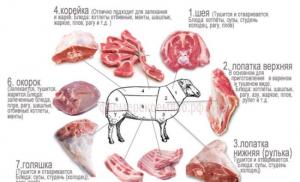When is World Safer Internet Day celebrated? International Internet Safety Day
international day safe internet Safer Internet Day is celebrated on the second day of the second week of the second month of the year. In 2017 it falls on February 7th.
Countries that do not have their own national centers can submit their pre-applications for participation in worldwide events to the Insafe network.
Within a few years, Safer Internet Day has transcended its original European framework and become a truly international holiday, celebrated on five continents.
In 2017, Safer Internet Day will be celebrated in about 130 countries.
The Day's events are held under various mottos. The slogan for Safer Internet Day 2017 is: "Be a force for change! Unite with others for a safer Internet!" (Be the change: Unite for a better internet).
In Russia, Safer Internet Day was first held in 2007.
In 2008, the Center for Safe Internet was created under the name "National Internet Security Hub in Russia", later called the Security Center in information society"Don't Allow!", which is an authorized Russian member of Insafe and a member International network"hotlines" to combat illegal content INHOPE, as well as the official organizer of events International Day secure Internet on the territory of Russia.
The official Russian part of the worldwide events dedicated to International Safer Internet Day is Safe Runet Week, which is held in the days leading up to it. In 2017, it runs from January 31 to February 7 inclusive. The Week's events take place in Moscow and many regions of Russia.
The Safe Runet Week was first held in 2008 on the initiative of the regional public organization Internet Technology Center (ROCIT) and the Russian office of Microsoft. Since 2009, the operator of the Week has been the ROCIT project "Safe Internet Center". Since the same year, Safe Runet Week has been included in the official events of the International Safer Internet Day, which are held in various countries peace.
The week is a group of events united by a common theme - the safety of Internet and mobile technology users, the positive and ethical use of digital services and opportunities, the role digital technologies in our daily safety.
Conferences are traditionally held as part of the Week, round tables, “direct lines” with experts, presentations of projects and initiatives in the field of safe Internet for children and adults, competitions are announced or their results are summed up, quizzes, information campaigns, television interviews are held - events of various formats and for different audiences.
The material was prepared based on information from open sources
Digital technologies are increasingly entering our daily life. Therefore, ensuring security on the Internet is one of the most pressing requirements of modernity and progress. A safe and positive Internet is not only about special security programs. This is, first of all, an abundance of positive content, knowledge of ordinary users about the basics of security, and public consensus regarding norms of behavior on the Internet. This is also a public-governmental partnership aimed at increasing the level of Internet security for ordinary users. And also these are Internet opportunities and services that come to the aid of people in almost any problem situation.
Since 2005, the main coordinator of Safer Internet Day in the world has been the non-profit organization Insafe (European Safer Internet Network), which consists of national centers created with the participation of the European Commission. All countries are members of Insafe European Union, as well as Iceland, Norway and Russia.
Each of the organization's national centers runs local Internet safety education programs, operates a helpline, and works with youth to provide an evidence-based, multifaceted approach to improving the Internet.
Within a few years, Safer Internet Day has transcended its original European framework and become a truly international holiday, celebrated on five continents.
In 2015, Safer Internet Day was celebrated in more than 110 countries around the world. In total, more than a thousand events were held in the participating countries under the motto “Let's create a positive Internet together!”
The slogan for Safer Internet Day 2016 is: “Play your part in creating a safer Internet!” (Play your part for a better Internet!).
Countries that do not have their own national centers submit their pre-applications for participation in worldwide events to the Insafe network.
In Russia, Internet Safety Day was first held in 2007.
In 2008, the Center for Safe Internet was created under the name "National Internet Security Node in Russia", which later became the Center for Security in the Information Society "NeDopusti!", which is an authorized Russian member of Insafe and a member of the International Network of Hotlines for Combating Illegal INHOPE content, as well as the official organizer of International Safer Internet Day events in Russia.
The official Russian part of the worldwide events dedicated to International Safer Internet Day is Safe Runet Week, which is held in the days leading up to it. In 2016, it runs from February 2 to February 9 inclusive. The Week's events take place both in Moscow and in more than 40 regions of Russia.
The Safe Runet Week was first held in 2008 on the initiative of the regional public organization Internet Technology Center (ROCIT) and the Russian office of Microsoft. Since 2009, the operator of the Week has been the ROCIT project "Safe Internet Center". Since the same year, Safe Runet Week has been one of the official events of International Safer Internet Day, which are held in various countries around the world.
The week is a group of events united by a common theme - the safety of Internet and mobile technology users, the positive and ethical use of digital services and opportunities, the role of digital technologies in our everyday security.
Within the framework of the Week, conferences, round tables, “direct lines” with experts, presentations of projects and initiatives in the field of safe Internet for children and adults are traditionally held, competitions are announced or their results are summed up, quizzes are held, information campaigns, television interviews - events of various formats and on different audiences.
The material was prepared based on information from open sources
The World Wide Web has spread throughout the world at a frantic pace and has covered civilized society with an imperceptible network. Positive traits local networks are undeniable. They were able to radically change their views on work, leisure, ways of communicating and obtaining information, and learning. Comfortable? Crazy. Fast? Incredible. But how safe is it? The issue of Internet safety has become so global that even a holiday identical to the problem has emerged, World Safer Internet Day.
The Internet can be viewed in different ways. But the importance cannot be underestimated local network in breaking through the economy and solving social issues. In addition, the virtual world is a fascinating, educational and multifaceted side of the life of many users.

Unfortunately, not all actions and information received on the local network are safe. It was the importance of solving Internet security problems that prompted the world community to create a holiday on a global scale.
Relevance of Internet security: who celebrates the holiday?
The rapid development of electronic and information technologies inevitably affected the life of every person. The Internet has become an integral part of it, and for some, virtual communication has completely replaced real communication.
The World Wide Web has changed man's views even on time and distance. Now it costs nothing to contact your friends or business partners located thousands of kilometers away. It is easy to find any information you are interested in with a couple of mouse clicks, instead of rummaging through volumes of books and other literature. What are they worth? educational programs. This is simply a godsend for parents and teachers, students and simply curious and creative individuals.
But not only ordinary users, but also unscrupulous people were able to take advantage of the network’s capabilities. And dangers await us online at almost every step. Don't underestimate the actions of cyber fraudsters.

Hackers, using various programs and viruses, gain access to our personal data, mail, cash flows. Such actions cause material and moral damage. Network “spies” steal and embezzle exclusive information and intellectual property. From which specific individuals, entire corporations, and even countries suffer.
And children and teenagers are especially vulnerable to online attacks. Their still fragile psyche reacts inadequately to the flow of negativity coming from the network. After all, pages that open links lead to sometimes terrify even adults.
The topic of negativity from the local network can be continued endlessly. And in the realities of geopolitical conflicts, the network is filled with hatred, calls for violence, and outright misanthropic slogans.
Therefore, we can safely say that World Safer Internet Day, when such problems are solved, is a holiday for everyone. This is an important day for ordinary citizens, regardless of age and status, and for any organization, enterprise, and of course, for the whole country.
history of the holiday
The Internet was originally developed for use by the US Army. But this technology quickly spread throughout the world and today there are up to 2.5 billion users on the network. And this is a third of the inhabitants of the entire planet.

And already in 2004, there was an urgent need to protect Internet users. This idea comes from the European Commission. With the support of European SchoolNet and Insafe, non-profit organizations, it was established special holiday related to safe internet issues. It quickly received international status. Today, World Safer Internet Day is celebrated in 84 countries. And the date chosen was the first Tuesday of February. In 2017, the holiday falls on February 7th. On this day, many public and government organizations will hold thematic events designed to teach people how to resist the actions of scammers on networks, and tell them where to look for help in case of material or moral damage.
Since 2008, the organization “National Internet Security Node in Russia” has been dealing with such issues. She is an official member of Insafe and helps users solve problems related to the safety of using various resources. For this purpose, a special resource has been created where any user can leave a complaint about dangerous or illegal content.
Every RuNet user must know not only the basics of working on the Internet, but also ways to protect themselves, their family, and their finances. On Safer Internet Day, February 7, it will be useful to learn simple but effective tips.
To ensure financial security:
- For payment systems and Email use different and, preferably, complex passwords. Choose tricky answers to your secret question, which will help you restore access to your account in the future, but will make life more difficult for scammers.
- Do not post personal information on forums and social networks. Remember that your phone number, address and other data can always be used by dishonest people.
- Control the movement of your finances using the mobile banking service and set limits on cash cards. This way you can track and prevent unauthorized expenses.
- Don't trust free networks V in public places. The provider of such networks is able to track traffic and will be able to use your data.
- Do not write access passwords in text files, and set separate passwords for the most important documents on your PC.
- If your phone or tablet is lost or stolen, try to quickly change passwords on important payment sites or block your money cards.
- Be sure to install a proven antivirus program and update it promptly.
An important issue is the safety of children on the Internet. And in many ways it depends on the attentiveness of parents. The Parental Control feature will help you block access to unwanted sites. Installing special software will help cut out advertisements, which often contain pornography or propaganda of cruelty.
Censor filters help to cope with many tasks. If such filters are not installed, do not allow your child to use RuNet without adult supervision.

It's much more difficult with teenagers. But it’s still worth asking what sites your child visits and with whom he corresponds on social networks.
Certainly, to the common man It’s difficult to protect yourself from all the negativity from the World Wide Web and from the actions of advanced hackers. But 80–90% of Internet security depends on the user’s own actions and desire to protect themselves.
Larisa, January 16, 2017.Human life is connected with receiving and exchanging information. The speed of these processes affects progress and labor productivity. The Internet has become a disruptive technology that has changed lives and the economy. Along with the benefits came dangers. They are associated with identity theft, malware, etc. An international holiday has been established to draw attention to this problem.
passes
International Safer Internet Day is celebrated annually on the second Tuesday of February. In 2017 it falls on February 7th.
Who celebrates
The event is celebrated by figures public organizations, funds, officials, government representatives, employees of companies in the field information security. Employees of institutions that protect personal data and combat malware join the celebrations. The holiday is celebrated in 90 countries around the world.
History and traditions of the holiday
The holiday originated in January 2004. It was initiated by the European Commission. Her idea was supported non-profit organizations European SchoolNet and Insafe. They perform tasks to improve the security of handling the World Wide Web.
The participants committed themselves to combating illegal content of global Internet resources and countering the spread malware. The idea has become widespread among users and government agencies.
The theme of the event is assigned annually. She touches current problems in the field of protecting Internet users and introducing new programs. On this day, educational events, conferences and seminars are held. Participants of public organizations talk about ways to protect personal data. Facilities mass media mention the event, post thematic materials. Thematic programs and films are broadcast on television. Proposals are put forward to improve methods of handling the World Wide Web, projects to improve security, reminders and rules of use are presented global network Internet. People who are related to the functioning of the Internet exchange congratulations and gifts.
The Internet emerged as a military technology for the US Army. She soon infiltrated civilian life. 2.5 billion people use the Internet.
Participants of the Insafe organization, which advocates for Internet safety, are all countries of the European Union, Iceland, Russia, Norway.
In the Russian Federation, since 2008, the “National Internet Security Node in Russia” has been operating - an authorized member of Insafe and the International Network of Hotlines to Counter Illegal Data INHOPE.
A web interface has been created as a mechanism for eradicating dangerous content. It allows each user to leave a complaint about violations of the resource.













